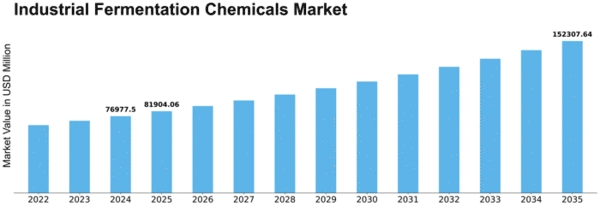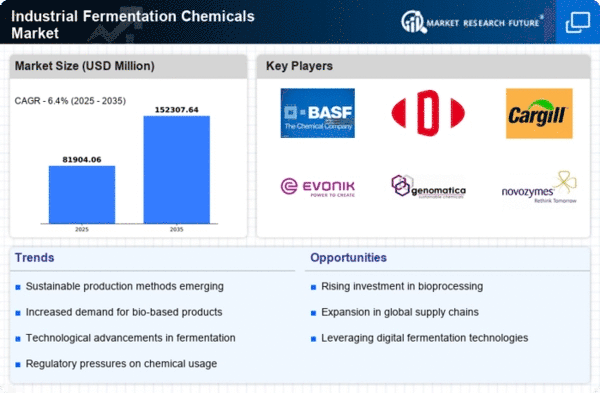Industrial Fermentation Chemicals Size
Industrial Fermentation Chemicals Market Growth Projections and Opportunities
The Industrial Fermentation Chemicals market is significantly influenced by various factors that collectively shape its dynamics within the biotechnology and industrial sectors. One of the primary drivers behind the growth of the Industrial Fermentation Chemicals market is the increasing demand for bio-based products and sustainable manufacturing processes. Industrial fermentation, a biological process that utilizes microorganisms to produce chemicals, enzymes, and other valuable compounds, has gained prominence as industries seek eco-friendly alternatives to traditional chemical synthesis methods. The market experiences growth particularly in applications such as pharmaceuticals, food and beverages, and biofuels, where industrial fermentation chemicals play a vital role in the production of antibiotics, enzymes, and ethanol.
The global Industrial Fermentation Chemicals market is accounted for to register a CAGR of 6.40% during the forecast period and is estimated to reach USD 1,11,659.03 million by 2030.
Economic factors play a pivotal role in determining the demand for Industrial Fermentation Chemicals. Economic growth, increased industrialization, and advancements in biotechnology contribute to the expansion of fermentation-based industries. The pharmaceutical and food industries, major consumers of industrial fermentation chemicals, invest in these products to enhance the efficiency and sustainability of their manufacturing processes. Conversely, economic downturns may lead to reduced industrial activities and impact the overall demand for fermentation-based products.
Raw material prices and availability are critical factors influencing the Industrial Fermentation Chemicals market. The primary raw materials used in industrial fermentation, such as sugars, starches, and nutrient sources, are subject to market fluctuations. Changes in raw material prices, weather conditions affecting agricultural production, and geopolitical events can impact the production cost of industrial fermentation chemicals, influencing market dynamics. Manufacturers in the industrial fermentation sector must closely monitor these factors to maintain a stable supply chain and competitive pricing.
Technological advancements contribute to the evolution of the Industrial Fermentation Chemicals market. Ongoing research and development efforts focus on improving fermentation processes, optimizing microorganism strains, and exploring new applications for industrial fermentation. Innovations in genetic engineering and synthetic biology enable the development of microorganisms with enhanced fermentation capabilities, contributing to the efficiency and cost-effectiveness of industrial fermentation processes.
Environmental regulations and sustainability considerations are increasingly shaping the Industrial Fermentation Chemicals market. As awareness of environmental issues grows, industries are under pressure to adopt cleaner and more sustainable practices. Industrial fermentation, being a bio-based and environmentally friendly manufacturing method, aligns with the broader trend towards sustainable production. Manufacturers are exploring ways to improve the environmental profile of fermentation-based products and meet regulatory standards to address environmental concerns.
Global market trends and trade dynamics also impact the Industrial Fermentation Chemicals market. The interconnectedness of economies means that changes in one region can have cascading effects on the supply and demand for fermentation-based products worldwide. Trade agreements, tariffs, and geopolitical events can influence the international trade of industrial fermentation chemicals, affecting market conditions for manufacturers and distributors. Companies in the industrial fermentation sector need to stay informed about global dynamics to navigate potential challenges and capitalize on opportunities.
Consumer preferences and industry standards contribute to the market factors shaping the Industrial Fermentation Chemicals industry. The demand for sustainable and bio-based products aligns with changing consumer expectations. Manufacturers are adapting their fermentation processes and product portfolios to meet industry standards and consumer preferences, including the development of bio-based chemicals with reduced environmental impact.



















Leave a Comment